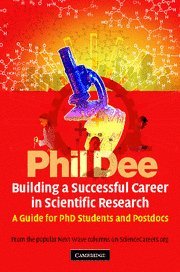Building a Successful Career in Scientific Research by Phil Dee – Book review
It’s been more than half a year since I read this book, but the main plus of this book is that it is written in such an entertaining and funny way. The material from this book just stayed better in the book of my head because the writing style of this book made me smile continuously.
You can read the first pages of the book on Google books, so you can check out and see if you like the writing style as much as I did.Oh, did I mention it has funny cartoons too?
Although the book is small (130 pages and large print), it packs a lot of information, and touches everything a PhD student needs to know from the very beginning (chapter 1: choosing and handling your PhD adviser) to way down your future career (chapter 18: do you have principal investigator (PI) potential). Most of it is written from the perspective of the UK system of a PhD study.
It is not my aim here to discuss every single section in the book, but I would like to highlight some sections which gave me great insights.
The first chapter (Choosing and handling your PhD adviser), gives some rules how to getting the best from you supervisor. These rules are:
1. communicate with your boss
2. keep your boss informed
3. discover what makes your boss tick
4. earn your boss’s respect
5. assert yourself
6. the golden rule: write for your boss
I should go over these rules and their explanation more often, as I tend to work by myself and only set appointments whenever I really need some input (as in, when I need a paper to be reviewed). Just keeping my supervisors posted on my progress has not really been my priority, since I feel that I would take too much of their precious time. It looks like it wouldn’t hurt me to put my hard work and myself a bit more into the picture for them.
Chapter 2 (motivation, time management and multitasking) has a great example of a Gantt chart as a tool for planning your project. Then Chapter 3 (handling the literature) gives some food for thought on literature review (great chapter for me these days, since I’m finally trying to get my literature review done). It gives some strategies for ruthless reading: slaying the literature dragon before the pile on your desk becomes an invincible stash which might have a gem in it. Chapters 4 and 5 deal with writing reports and giving presentations.
After part I of the book (the first couple of years), the book continues with part II (the end of the beginning).
Chapter 6 (writing papers and abstracts) gives some great guidelines for making rapid writing-up possible. These are:
1. focus on success
2. prepare your figues
3. get up to speed with the literature
4. remind yourself of your purpose
5.get out of the lab
6. set a deadline
Point 4 says: “Constantly remind yourself that the reason you get up in the morning is to write scientific papers.” I don’t fully agree (there’s much more in life than publishing myself to death), I do recognize the importance of getting all the hard work from the lab outside the walls of my university.
Chapter 7 gives some thoughts on conferences and poster presentations. It shows a very clear example of a good and a bad poster, which inspired me significantly last time I was making a poster.
Chapter 8 deals with writing and defending the thesis and consequently chapter 9 deals with coping with pressure and stress.
Parts III (the transition to post-doctoral research) and IV (making it in science) were nice to read and keep in the back of my head, but of little practical value for me to put into practice right away.


But I will say that there was nothing to chant, nothing to look at, and it had the same aim as any meditation – to empty the mind.